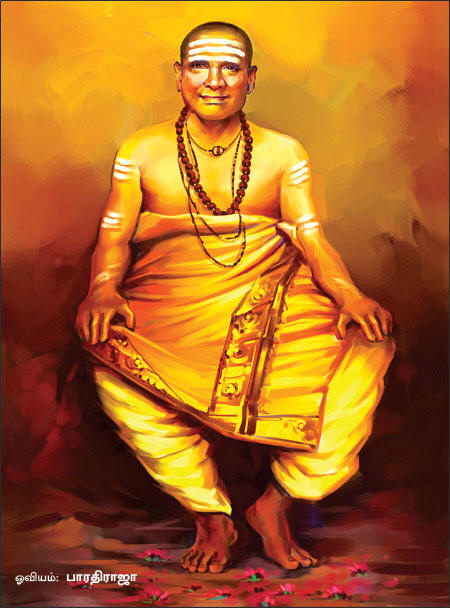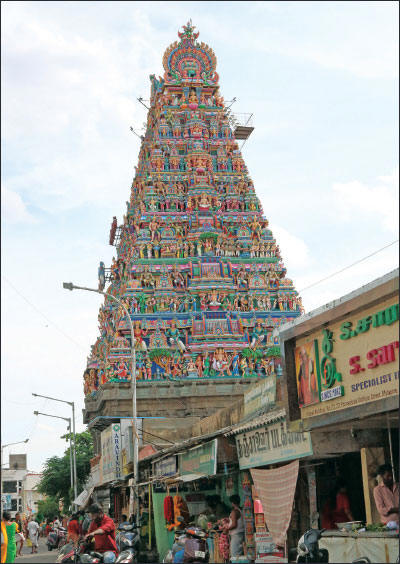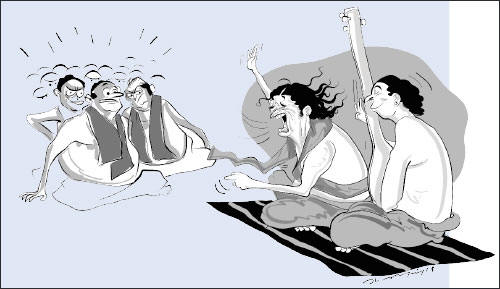006திருவருள் செல்வர்கள்
திருவருள் = Divine Grace
செல்வர் = Starets
செல்வர்கள் = Staretsy (Plural)
"staretsy" is a plural form of "starets":
http://www.memidex.com/staretsy
Starets = spiritual leader(s) whose wisdom stems from God as obtained
from ascetic experience.
Guhasrī Rasapathi Aṭikaḷ--Continued from 005StaretsDivineGrace.html
Author: பி.என்.பரசுராமன் P.N.Parasuraman
Images: செ.விவேகானந்தன் S.Vivekanandan
That day was a wedding day for the son of his maternal uncle. People were coming and going. The feast lasted from 10 a.m. to 3 p.m. Maternal uncle’s family paid no attention to Aṭikaḷ on regular days. No one kept track of Aṭikaḷ. 2
No one in the family paid any attention to Aṭikaḷ and his sister. 3
‘To be bereft of one’s mother is a sin.’ This is a precious saying in Tamil. It came true in the case of Aṭikaḷ and his sister. Aṭikaḷ was hungry for a long time. He and his sister sat down to eat at the wedding feast with other guests. The food was served. The maternal uncle brought a guest holding his hand and guiding to the feast table. Not finding a seat for the guest, the uncle went to Aṭikaḷ, grabbed him by the hand holding the morsel and told him, “What is the hurry now for you? Let us do it later!” The uncle pulled Aṭikaḷ off his seat and seated his guest in his place. 4-5
That rejection and expulsion off the dining table shook Aṭikaḷ to the core. Thinking to himself, “The morsel reaching the hand never reached the mouth,” he took his sister and went to the temple. He pleaded with the Goddess, “Ammā, you caused so much pain to us.” He cried and lamented. The night fell. Famished and weak, he and his sister slept at the entrance to the temple. 6 கைக்கு எட்டியது வாய்க்கு எட்டாமல் போய்விட்டதே = “What reached the hand could not reach the mouth.” = “The morsel reaching the hand never reached the mouth.”

Next day! Early in the morning, he got up, finished his morning worship and left for Chennai with his sister on foot. 7
There was a river to cross. It was the cōvam river (unlike what it is today: dirty, polluted, and stagnant). The river water was brisk and lapping on the shore. His sister panicked. He comforted her, put her on his shoulder, and waded the river thinking, “If the afterlife comes now, let it be so.” As he waded the river, the small waves lapped on the knees, hips, chest and now on the neck. The sister on his shoulders cried all the way in panic, ‘’Aiyō! Aiyō!’’ Sister’s wailing never registered in Aṭikalār’s ears. 8-9
Aṭikaḷ’s mouth and mind cried out, “Murugā!Murugā!” The floods reached the level of his mouth. Those floods, hearing his fervent appeal to Murugan and as if the river was bound to Satyam, ran shallower. He reached the other side of the river on the firmer ground, continued his journey and reached Mylapore in the evening with his sister. 10
The biological father in Mylapore seeing the hungry look of his children was brimming with tears. He came to know all the sordid details. The tears welled.11
The father came to a conclusion, “Children should never be sent to such a wicked person.” He told the children, “You go there no more. You stay with me from now on.” Comforting them, he fed his children. 12
Aṭikaḷ stayed with his father in Mylai (Mylapore) for his education, went to the temple, committed Muruga Mantra to memory, and chanted Tiruvarutpā, not wasting even one minute of his time. Once his evening worship was complete, he read his books in the glow of street lights. He received the book by Vaḷḷālar “Mahādeva Mālai” from a Brahmana and committed all 100 poems to memory in ten days. He was nine years old then, in his third grade. 13
Knowing the progress made by Aṭikalār, the Brahmana gave him four Aṇās (quarter Rupee). He bought with that money a coconut, a fruit, a bunch of Pan leaves, and areca nut, gave them to the Brahmana and asked him to perform a Pūjā. The Vēthiyar was wonder-struck and blessed him often, “You will live nobly.” Aṭikaḷ used to tell in later years, “The Vēthiyar’s blessings uplifted me to a spiritual position.” This was his frequent recollection and mention to his audience. After these episodes, his father sent him to learn carpentry to support the family. 14
One day, the owner of the carpentry shop became very angry and slapped Aṭikaḷ on his face, saying, “You idiot, don’t you have any brains?” 15
Then what? He went straight to Kapālīṣvarar sanctum and made a vow with closed eyes, “Never again. I will not touch the carpentry tools.” He kept his eyes closed. A voice came, “Here, take it.” He opened his eyes. 16
Gurukkaḷ stood before him and gave him the Vibhūthi (sacred ash), and the flowers. Having been pleasantly surprised at the Divine Grace, he stopped going to work. He stayed in the temple premises, spent most of his time there and ate Temple Prasāda (like temple-cooked chickpeas meant for devotees). He slept anywhere he can stretch his mortal frame. He went home sometimes. This was his life after quitting his day job. 17
Unwilling to condemn his son, the father kept silent. When he was in the temple, with no self-awareness, he chanted poems playing musical instruments and explained the poems. The small crowd became a bigger crowd with the passage of time, and he earned the name, ‘Prasaṅga Bhūṣṇam.’ Every day he read the devotional literature, achieved the expertise in them and lectured all over Chennai. The audience was impressed with his mastery of subtle and inner meanings of what he read. His admirers asked him to write purport and explication of Vaḷḷālar’s Tiruvarutpā. 18 பிரசங்க பூஷணம்’ = Prasaṅga Bhūṣṇam = Lecture + Jewel = Jewel of a lecturer = Esteemed speaker.
Agreeing to the proposal, Aṭikalār wrote an interpretation of verses. Wherever a doubt came, he consulted experienced people. Once it happened. He spoke to many people. No explanation was forthcoming to clear his doubt in one instance. He talked to the learned people and asked whether anyone wrote explications. No help was in sight. He was unhappy. He was afraid whether his undertaking would end up in failure. He went straight to Kantha-k-kōṭṭam temple and prayed to Murugan. 19
He was awake that night for a long time before he went to sleep. Early in the morning, he had a dream. A five-year-old boy in the guise of Ārumugapperumāṉ told him, “My dear devotee, don’t worry! The explanation that you are looking for is with a grandmother in Mandai Veḷi town next to Mylai.” He gave her address and disappeared from his dream. 20
He jumped out of bed startled. Taking a bath and finishing morning obligatory deeds, he ran to the address given to him by Muruga Peruman. He met a mature old woman, who asked him, “Who are you, youngster? What do you want?” As she spoke, she tore the sheets and fed the flame in the hearth to boil the water. 21
Seeing the papers going in flames, he tremulously asked the old woman, “Grandma! What is this?” 22
Grandma: “The bookworms have eaten these books. I have no time to read them. That is why I offer these books to Agni Bhagavan (Fire God). 23
Aṭikaḷ stopped the burning of the moth-eaten books and read them. He opened the rescued books, cleared his doubt, tied up the moth-eaten books into a bundle and took possession of the books. He gave Rs.5.00 to the old woman, who said to him, “Appā, if you sell these books to a waste paper merchant by weight, you may not get half or three-quarters of a rupee. For a whole lot of this junk, you gave me Rs. 5.00. God bless you!” 24

He took the bundle of books, went straight to Kanthakottam Murugan Temple, put the bundle at God’s feet, offered his homage to him with melting heart and returned back home. 25
Aṭikaḷ married Jayalakshmi in Tiruvallikkeni. They lived on whatever money he made by lectures. Aṭikaḷ thought, “When will God confer on me the grace to remove my poverty?” 26
That evening, a devotee came in a horse-drawn cart and gave him Rs.20.00. The donor said, “I know you very well.” He pleaded with him, “Without rejection, please take the cash.” 27
Aṭikaḷ felt his hair stand on end. “O my God! I supplicated to you only this morning. Soon, you gave me your grace!” He shed his tears. The visiting guest took Aṭikaḷ to his house in Rayapuram, asked him to stay there and told him, “The Piḷḷaiyār Temple is nearby. You must give two lectures a week. I gave Rs.20 as an advance.” Besides, he gave two silk Vēṣtis (Dhotis), one shawl, one silk sari, one silk blouse, and Rs.5 on a plate and paid homage to Aṭikaḷ. 28
The lectures, Aṭikaḷ delivered according to the agreement. Once the talks were completed, the rich man was happy to honor him with a five-pound-sterling medallion cum Rudrākṣa garland. 29
Besides lectures, he wrote critical commentaries on over 200 treatises. He lived in our times. People celebrated him as a great man. We know only a few events related to him. Though hardship and penury chased and faced him, he vanquished them by taking refuge in God. 30
He returned to his North Chennai home, after delivering a lecture in Vadalur in 1968. That day, in his own home in North Chennai on Sanjivi Rayan Street, he merged with God’s holy feet. 31
Divine Grace will grow.
Images: S. Vivekananthan.

இனிய குரல், எடுப்பான இசை.
ஆனால் அந்த இசைவாணர் பாடியதோ, மன்றத்தில் உள்ளோரை அவமதிப்பதாக இருந்தது.
ஏன் இராது? சபையின் முன்பாக ஓர் இசைவாணர், ‘தூ... தூ... போ... நாயே...’ என்று பாடினால், யாருக்குதான் கோபம் வராது.
ஆனால், அவர் இரண்டாம் அடியைப் பாடியதும் கோபம் மறந்து சிரிக்க ஆரம்பித்துவிட்டார்கள். காரணம், ‘ஆதி நாள் சுந்தரர்க்கு அன்புடனே...' என்ற இரண்டாம் அடியை அவர் பாடியபோதுதான், அவர்கள் உண்மையை உணர்ந்தார்கள்!
அதாவது, `தூது போனாயே...' என்ற முதலடியை, தமது வித்வத்தை வெளிப்படுத்தும் பொருட்டு நிறுத்தி நிதானமாக நிரவல் செய்து, “தூ... தூ... போ... நாயே....” என்று பாடி, பாசுரத்தின்
பொருளையே பாழாக்கிவிட்டார்!